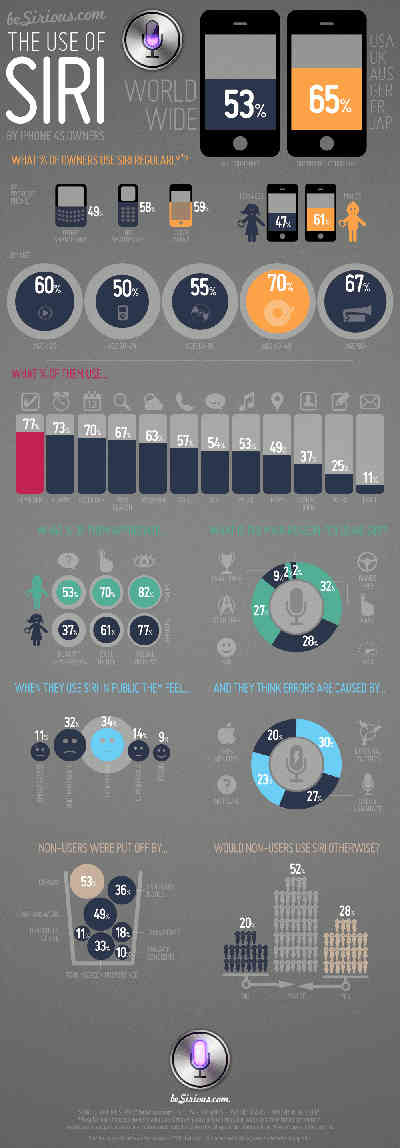| Be Sirious - Who Uses Siri? |
| Written by Lucy Black | |||
| Sunday, 18 November 2012 | |||
|
Two thirds of iPhone 4S users who live in countries that support the service use Siri. The question is why? What do they get out of it and what characterizes the one third who don't like Siri? The top results are that males are more likely to use Siri than females and it is most popular with the age group 40-49. The finding come from a survey undertaken by researchers at UCLIC (University College London Interaction Centre) who invited iPhone 4S users to participate in an online survey to look at the use of Siri as an Intelligent Assistant System. The demographics of Siri use are a bit surprising with males being much more likely to take advantage of Siri's help than women. Even more surprising Siri is most popular with older age groups. It would be interesting to see "age" and "main reason for using Siri" cross tabulated but this isn't provided in the analysis. The reason is that "Easy "is the most popular reason for using Siri, followed by "Fast and Fun" - so it is probably that male oldies probably find Siri "easy, fast and fun" which fits in with the stereotype. Looking at what Siri is used for - Reminders, Alarms and Calendar function come top of this list with Web Search and Weather next. Functions that require user input - email and notes are least popular. Does this suggest that Siri's output is more popular than Siri's input? Non-users were put off Siri mostly by errors (53%) or Poor Answers (49%) but users tended to blamed External Factors (30%) and the User's Language (27%) rather than Siri's Abilities (20%). So amazingly it seems that even the one third of non-Siri users were inclined to give her the benefit of the doubt - "It's my fault Siri not yours..."
Click for hi-resolution version
The results are contributing to a study that explores how people actually use Voice Driven Interfaces and what they think about them which aims to investigate issues of Human-Computer Interaction is real world situations. The study is looking at the development of the relationship between the user and the technology, the user’s adoption and adaptation of the technology to their practices and the factors determining their preferences throughout time. It was felt that such an approach should bring up valuable data exploring at least three themes: functional factors for adoption, extent of adoption and socio-cultural dimensions of use.
More InformationRelated ArticlesWhat do you get when you add HAL to SIRI? Iris - Siri for Android proves Apple doesn't have an edge
Comments
or email your comment to: comments@i-programmer.info
To be informed about new articles on I Programmer, install the I Programmer Toolbar, subscribe to the RSS feed, follow us on, Twitter, Facebook, Google+ or Linkedin, or sign up for our weekly newsletter.
|
|||
| Last Updated ( Sunday, 18 November 2012 ) |



